Prosecutorial Misconduct Reaches Epidemic Proportions
From the Bush-era torture memos to everyday criminal trials, prosecutorial misconduct has been running rampant.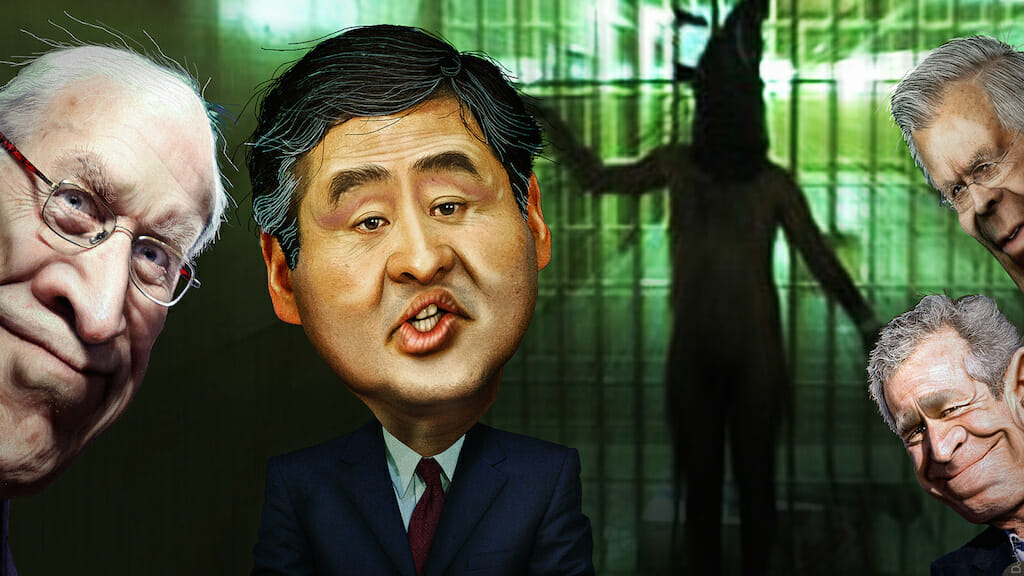 A caricature of the torture team (from left): Dick Cheney, John Yoo, George W. Bush and Donald Rumsfeld. Yoo, an attorney in the Justice Department's Office of Legal Counsel during the Bush administration, authored the memos used to justify torture in the "global war on terror" after 9/11. Now he is a tenured professor at the UC Berkeley School of Law. (CC BY-SA 2.0 / DonkyHotey)
A caricature of the torture team (from left): Dick Cheney, John Yoo, George W. Bush and Donald Rumsfeld. Yoo, an attorney in the Justice Department's Office of Legal Counsel during the Bush administration, authored the memos used to justify torture in the "global war on terror" after 9/11. Now he is a tenured professor at the UC Berkeley School of Law. (CC BY-SA 2.0 / DonkyHotey)
In February 2010, the Justice Department published a long-awaited report prepared by its Office of Professional Responsibility (OPR) that found former Office of Legal Counsel (OLC) attorneys John Yoo and Jay Bybee had engaged in professional misconduct by authoring two memorandums in 2002 and 2003 justifying the use of torture in the crackdown on suspected terrorists in the wake of the 9/11 attacks.
A full 260 pages long, the OPR report is formally titled the “Investigation into the Office of Legal Counsel’s Memoranda Concerning Issues Relating to the Central Intelligence Agency’s Use of ‘Enhanced Interrogation Techniques’ on Suspected Terrorists.” Completed in July 2009, it concluded that Yoo and Bybee had failed to provide the George W. Bush administration, for which the torture memos had been written, with the “thorough, candid, and objective” legal analysis that is incumbent upon all lawyers working in the OLC. The report recommended that Yoo and Bybee be referred to their respective state bar associations to face disciplinary actions against their licenses to practice law. At the time, Bybee was a member of the District of Columbia bar, while Yoo was licensed in Pennsylvania.
Neither man, however, was ever referred for sanctions.
On the same day the Justice Department released the OPR’s report, it also disclosed a 69-page memo written by Associate Deputy Attorney General David Margolis that absolved Yoo and Bybee of misconduct. A career prosecutor who died in 2016, Margolis had been assigned since the 1990s to review adverse OPR findings entered against wayward Justice Department lawyers. Margolis determined that while the torture memos, which approved such brutal tactics as waterboarding, were “flawed,” they did not in the “context” of the nation’s post 9/11 emergency cross the line into formal misconduct or exhibit bad faith in violation of international human rights standards.
Today, Yoo is a tenured professor at the University of California School of Law at Berkeley. He holds an endowed chair, and teaches in the school’s program on public law and policy.
Bybee is a judge on the 9th U.S. Circuit Court of Appeals. He was nominated to the bench by Bush in 2002. His appointment was confirmed by the Senate in 2003, well before the torture memos were made public, by a vote of 74-19.
If Yoo and Bybee’s transgressions were merely isolated instances of misconduct, they would have been bad enough. But they weren’t isolated.
Nor is prosecutorial misconduct confined to high-level federal lawyers responsible for setting the nation’s legal agenda. To the contrary, prosecutorial misconduct is endemic to nearly all jurisdictions of the American legal system. According to some observers, misconduct across the country has reached epidemic proportions.
Most often prosecutorial misconduct occurs at the state level in ordinary criminal cases. And it can take many forms—from the withholding of exculpatory evidence and overcharging defendants with more offenses than warranted to the destruction of evidence, subornation of perjury from government witnesses and pressuring defense witnesses not to testify.
A study conducted by the Innocence Project of more than 4,000 cases decided by California appellate courts and the 9th Circuit from 1997 to 2009 found that prosecutorial misconduct had occurred 707 times, an average of more than once per week. Of the 707, however, only 159 guilty verdicts, about 20 percent, were reversed.
Even more tellingly, the Innocence Project found that of the 4,741 public disciplinary actions reported by the California State Bar during the same time period, only 10 involved prosecutors, and a scant six of those concerned misconduct committed during a criminal trial. No prosecutors were criminally charged for their misdeeds.
The project’s study did not examine misconduct committed in cases that were plea-bargained rather than taken to trial. Since some 97 percent of criminal cases are pleaded out, the study only scraped the surface of the misconduct epidemic.
Similar conclusions have been reached about misconduct in other jurisdictions by other researchers and news outlets. Among the most prominent are the compilations put together by:
● USA Today, which focused on 201 cases tried nationally in federal courts between 1997 and 2010 in which appellate judges later determined that some kind of prosecutorial conduct had taken place. The survey found that only one Justice Department prosecutor had been temporarily disbarred in all the cases reviewed.
● The Chicago Tribune, which examined 11,000 cases from around the U.S. from 1963 to 1999. Of this total, appellate courts reversed convictions in 381 cases, including 67 death penalty judgments. Yet not a single state disciplinary agency publicly sanctioned a single government lawyer.
● The Liman Prosecutorial Misconduct Research Project of Yale University, which in 2011 published the results of a detailed investigation of the ethical rules and disciplinary practices of all 50 states. All were found sorely lacking for holding prosecutors accountable.
From a legal standpoint, the Supreme Court bears a good deal of responsibility for the giant pass that prosecutors are given in our courts as a result of its ruling in the landmark 1976 case Imbler v. Pachtman.
Following his conviction of first-degree murder in Los Angeles, Paul Imbler filed a federal damages lawsuit under Title 42, section 1983, of the United States Code after newly discovered evidence revealed that the prosecutor, Los Angeles County Deputy District Attorney Richard Pachtman, had knowingly used false testimony against Imbler at trial.
Section 1983 lawsuits are the principal means that wrongly convicted defendants and those subjected to false arrests use to sue state and local police in federal court for violating their constitutional rights. The key issue on Imbler’s appeal was whether the Supreme Court would extend section 1983 suits to state and local prosecutors as well as police.
The Supreme Court declined to do so. Instead, in an opinion authored by Justice Lewis Powell, the court unanimously held that prosecutors should be shielded with absolute immunity from section 1983 damage actions.
Although Powell recognized the awesome power prosecutors exercise, noting that they “stand perhaps unique, among officials whose acts could deprive persons of constitutional rights,” he insisted absolute immunity was required to protect them from the floodgate of litigation that might be initiated by disgruntled criminal defendants and arrestees.
As I have noted in this column before, prior to joining the Supreme Court, Powell wrote a historically important memo on behalf of the U.S. Chamber of Commerce that urged the business community to become more proactive in its use of litigation to counteract the impact of progressive legal groups like the NAACP and the ACLU.
In his Imbler opinion, Powell recognized the potential chilling effect that absolute immunity would have on efforts to hold prosecutors accountable for their misdeeds. To mitigate that impact, he reasoned, in language that seems even more cynical and clueless today than in 1976, that truly bad prosecutors who willfully violate constitutional rights could be prosecuted criminally, or otherwise subjected to state bar discipline.
Last year, the Supreme Court closed yet another door for holding prosecutors accountable in a case dealing with civil damage actions against federal prosecutors—Ziglar v. Abbasi.
The Ziglar litigation was brought by the New York-based Center for Constitutional Rights (CCR) on behalf of six men of Arab and South Asian descent who were arrested in the immediate aftermath of 9/11 and subsequently held and abused in a federal facility in Brooklyn for up to six months before being deported. The CCR sought to hold former Attorney General John Ashcroft and former FBI Director Robert S. Mueller III, among other officials, liable for the plaintiffs’ extended detention and mistreatment.
The litigation dragged on for years with the Justice Department seeking to dismiss the complaint, and the CCR contending the case should proceed under the authority of the Supreme Court’s 1971 decision in Bivens v. Six Unknown Federal Narcotics Agents, which recognized the propriety of civil damages actions against federal law enforcement agents for Fourth Amendment violations.
Finally, in a fractured 4-2 decision in the Ziglar case issued last July (in which newly appointed Justice Neil Gorsuch did not participate, and from which Justices Sonia Sotomayor and Elena Kagan recused themselves), the court declined to extend the Bivens remedy to federal supervisory personnel like Ashcroft and Mueller, particularly when the conduct complained of took place during a time of national crisis.
When Imbler and Ziglar are combined with laws in place throughout the country that immunize prosecutors against civil damage suits brought in state court, it’s hard to imagine putting an end to the misconduct epidemic.
Still, there are some corrective steps that can and should be taken.
First, states could follow the lead of California and get serious about criminally prosecuting bad prosecutors. In 2016, California enacted legislation making it a felony for prosecutors to knowingly withhold or falsify evidence.
In addition, state bar associations could adopt tougher disciplinary standards on prosecutorial misconduct. Last year, the State Bar of California amended its rules of professional responsibility to enhance disciplinary actions against prosecutors who withhold exculpatory material from defense attorneys.
The voting public can also act by electing district attorneys committed to changing the win-at-all-costs cultures that exist in many prosecution offices. The people of my home town of Philadelphia did that last November, when, against all odds, they elected longtime anti-police-abuse lawyer Larry Krasner as their new D.A. Krasner has pledged to make justice rather than convictions the highest priority of his tenure.
Finally, the Supreme Court could reverse the Imbler decision, and replace the absolute immunity prosecutors currently enjoy with what is known as “qualified immunity,” which would give prosecutors lesser, but still stringent, case-by-case protections from civil liability.
But let’s not fool ourselves. Being a prosecutor is hard, high-pressure work, even under the best of circumstances. Lawyers would never join the Justice Department or take a job as a deputy D.A. if they could be hauled into court for every discretionary decision they make. Some protections are warranted.
And let’s not fool ourselves either about the essential role prosecutors play in the criminal justice system. Mueller and Ashcroft, for example, may have violated constitutional rights in the backlash against the 9/11 attacks, but as the Justice Department’s special counsel today, Mueller is the strongest check we have on the neofascism of the Trump administration.
Without prosecutors—and I say this as a former death penalty defense lawyer—we would have no justice system. The goal, therefore, should be to craft a system that encourages lawful prosecutorial behavior while punishing the worst instances.
We may never eliminate prosecutorial misconduct altogether, but no one should be considered above the law.
Your support is crucial…With an uncertain future and a new administration casting doubt on press freedoms, the danger is clear: The truth is at risk.
Now is the time to give. Your tax-deductible support allows us to dig deeper, delivering fearless investigative reporting and analysis that exposes what’s really happening — without compromise.
Stand with our courageous journalists. Donate today to protect a free press, uphold democracy and unearth untold stories.

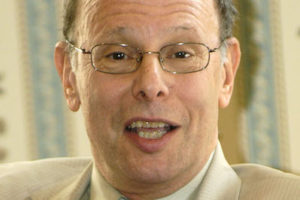
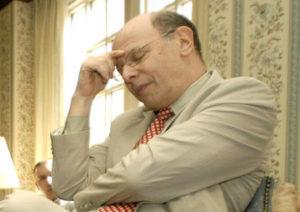
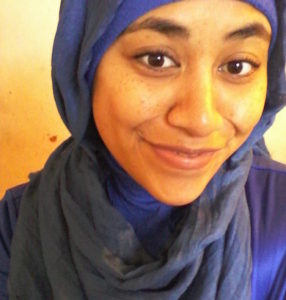
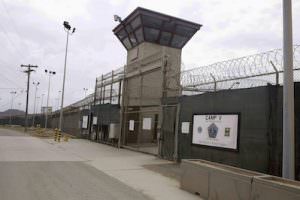
You need to be a supporter to comment.
There are currently no responses to this article.
Be the first to respond.